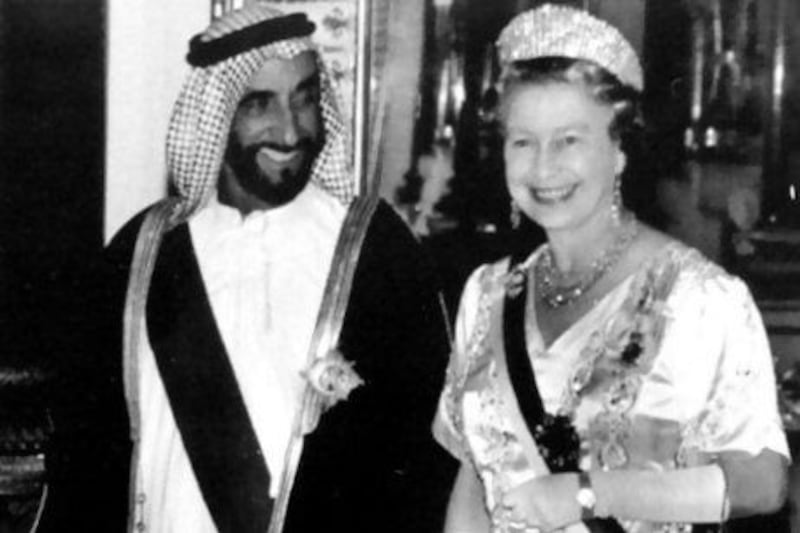LONDON // It took place against a backdrop of turmoil in the Middle East, while headlines in Britain were dominated by the controversial policies of Margaret Thatcher's Tory government.
And nearly 24 years since Sheikh Zayed went on the first state visit to Britain in June 1989, similarities are plentiful.
Then, as now, the region was marked by uprising and civil war, while in Britain the government had sparked a backlash over tax reforms.
But Sheikh Khalifa's state visit with Queen Elizabeth this week also shows how far relations between the two countries have evolved.
In 1989, The Times commented on the "remarkable achievement" of Sheikh Zayed in "welding together" the emirates into a united nation. Oil revenue, it was noted, was recovering after the uncertainty of the Iran-Iraq war, and in a two-page spread, the newspaper noted a "new optimism" for "an era of peace".
Those in Britain dismayed by the quick pace of development fuelled by Sheikh Zayed's "determination to use oil revenue to pull his country into the 20th century" were dismissed as "romantic British orientalists".
Today any "romantic" voices have largely disappeared. No one disputes the importance to both countries of a trade relationship on target to reach £12 billion (Dh68bn) by 2015. The UAE is Britain's 13th biggest export market and more than 100,000 Britons live, work and study here.
But perhaps nothing better illustrates how ties have developed than tourism. A relatively new industry in 1989, The Times predicted that the number of tourists from Europe would reach the dizzy heights of 9,000 in 1990. Last year, about a million tourists from Britain alone visited the UAE, according to the BBC.
The two countries' relations are almost unrecognisable from when Britain became the second country to recognise the UAE in 1971, says Khalid Almezaini, assistant professor of Gulf Studies at Qatar University and visiting fellow at the London School of Economics.
While relations are historical, Mr Almezaini says, with Britain a presence in the region since the 1820s, in the two decades after the UAE's founding they were largely about economics.
"After the 1970s and 80s, the relationship developed even further to include all aspects, social, cultural, economic and even political," he says.
Sheikh Zayed's 1989 state visit marked a turning point. He arrived in Britain with stable oil prices and an immediate neighbourhood much improved after the end of the Iraq-Iran war in 1988, a propitious time to expand relations.
Nevertheless, the wider region was also marked by unrest. The Palestinian intifada against Israeli occupation was in full swing, while a long-running civil war continued to tear apart Lebanon.
The turmoil punctuated Sheikh Zayed's visit. In his four days here, Ariel Sharon - then Israeli trade and industry minister, after being stripped of his defence portfolio for his role in the massacres of Palestinian civilians at two refugee camps in Beirut in 1982 - called publicly for the murder of Yasser Arafat, the late leader of the Palestine Liberation Organisation.
Unfazed by this - or the absence of official relations between the British government and the PLO - Sheikh Zayed invited Bassam Abu Sharif, a senior Arafat adviser, to Buckingham Palace.
The meeting caused a stir in the British media, with coverage of the state visit - the two-page spread in The Times apart - otherwise limited. The Independent suggested it had "embarrassed" Geoffrey Howe, the foreign secretary, even though he and Mr Sharif a week earlier had held the first ever publicly acknowledged meeting between British and PLO officials.
Buckingham Palace even issued a statement saying the meeting had been prearranged and that as guest of the queen, Sheikh Zayed was entitled to any visitor he wished.
A peace process that was then being conducted behind closed doors had no success, of course, and the Palestinian issue still festers. Today, however, the region is also grappling with the reverberations of the uprisings of the Arab Spring, while it is Syria's civil war that is likely to top the regional security agenda.
Weighty issues aside, some things are not being left to chance for Sheikh Khalifa's visit. His four-day state visit with the queen fell victim to what was then called the "British disease", industrial action.
A mooted rail strike forced the shelving of plans to land at Gatwick Airport south of London, to arrive by train at Victoria and for a guard of honour. Instead, Sheikh Zayed flew to Heathrow and was driven directly to London's Buckingham Palace for the official reception.
At most, Sheikh Khalifa's visit will cause some mild congestion in the more tranquil environs of Windsor, where roads will be closed for the welcoming parade on Tuesday.
okarmi@thenational.ae
twitter: For breaking news from the Gulf, the Middle East and around the globe follow The National World. Follow us
UAE founding father's state visit united nations
On the eve of Sheikh Khalifa's visit to the UK this week, we reflect on Sheikh Zayed's first state visit to Britain 24 years ago.

Editor's picks
More from the national




